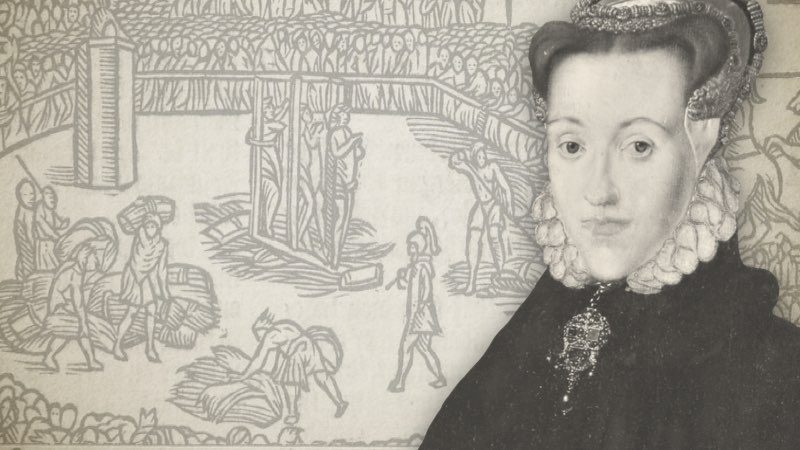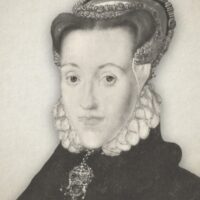
The Life And Martyrdom Of Anne Askew
The Sower 1880:
“Drunken with the blood of the saints, and with the blood of the martyrs of Jesus,” is one of the features of the woman, described in the Apocalypse, upon whose forehead was this name written, “Mystery, Babylon the great, the mother of harlots and abominations of the earth.” The Popes of Rome, in virtue of their assumed right to govern the souls and bodies of men, and to say what is and what is not to be believed, have ever waged war with those who have dared, even upon Scriptural and patriotic grounds, to oppose their power and resist their tyranny. Ever jealous of their dogmas and their institutions, these pretended successors of the Apostle Peter, proudly styling themselves “vicars of Jesus Christ,” have hunted and tormented, burnt and killed, hundreds and thousands of their fellow-creatures, whose only “crime” has been the preference of the Word of God to the dictates of Rome; and, consequently, these noble heroes of the past deserve our admiration on account of their firm adherence to the Gospel of the grace of God, at a time when such firmness and such fidelity exposed them to the wrath and indignation of the world. No matter who the offender—whether monarch or peasant, nobleman or mechanic, master or servant—if he were guilty of doubting one of the dogmas of Popery, such a person, when Rome ruled supreme, must be led to the stake. Regardless of sex, the agents of Rome have been guilty of subjecting even amiable and talented women to the most excruciating tortures; and their hearts have been so steeled by bigotry and malice that they have resorted to the most cruel arts human ingenuity could devise for the prolongation of the sufferings of their gentle victims. Can language be found strong enough to condemn this system, that so brutalizes the conduct of its votaries as to cause them to indulge their spleen and malice in actions of such a detestable and heartrending character? Such a case was that of Anne Askew; and it stands not alone on the records of Rome’s cruelties and persecutions. The history of the Papacy is one continuous narration of cruel deeds and awful tragedies, of horrible butcheries and mischievous plots; and, as these barbarities and machinations have been directed against the truth of God, resulting in the slaughter of thousands upon thousands of the saints of the Most High God, we have here sufficient proof that the Papacy is “drunken with the blood of the saints,” which is but one link in the chain of indisputable evidence, identifying that system with the great Apostacy, the existence of which was foretold by the prophet Daniel and the Apostles Paul and John.
Anne Askew was the daughter of a Lincolnshire knight, and was married to a bigoted Papist, who expelled her from home on account of her love of the Scriptures and of evangelical truth. Having a brother in the king’s body-guard in London, she naturally went to court, where, at that time, there were a number of ladies, including Queen Catherine Parr, favourably inclined towards the Reformation. These ladies held prayer-meetings in the Queen’s private chamber, and occasionally some minister of the Gospel was invited to expound portions of Scripture to them. Such a manifest love for God’s truth in such high quarters was very distasteful to the Romanists, and they determined to make an example of one of these ladies. Anne Askew was the selected victim, and she was first examined in March, 1545. Being brought before the Lord Mayor, a bigoted Papist, she was gravely asked whether a mouse, if it ate the Host, received God or no. “I made no answer, but smiled,” says our heroine in her account of these proceedings. The bishop’s chancellor then sharply said, “St. Paul forbade women to speak or to talk of the Word of God.” “How many women,” replied she, “have you seen go into the pulpit and preach?’’ “Never any,” was the answer. “You ought not, then, to find fault with poor women, except they have offended the law,” was the clever retort.
One of her cousins, being desirous of getting Mrs. Askew out on bail, applied to the Lord Mayor, who told him to go to the bishop’s chancellor, and he again referred him to the bishop, who called Anne before him, and examined her at great length. The bishop implored her to speak her words without fear, and to utter all things that burdened her conscience. She answered him that she had nought to say, for her conscience was burdened with nothing. Then Bonner told her, “If a man had a wound, no wise surgeon would minister help unto it before he had seen it uncovered. In the same manner can I give you no good counsel,” added the bishop, “unless I know wherewith your conscience is burdened.” “My conscience,” replied the noble lady, “is clear in all things, and to lay a plaister unto a whole skin would appear much folly.” Many questions were put to her concerning the Lord’s Supper, to many of which she simply replied, “I believe as the Scripture doth teach.” The bishop was very displeased at her taciturnity, and sharply asked her why she had so few words. Anne answered, “God hath given me the gift of knowledge, but not of utterance; and Solomon saith that ‘a woman of few words is the gift of God.'” She was at length liberated on bail, her sureties being her cousin Britain and a man named Spilman, of Gray’s Inn.
But Mrs. Askew’s love for the Gospel constrained her to attend the meetings of the Protestant ladies at court, and, therefore, she was again arrested and brought before the Privy Council, in the year 1546. Lord Chancellor Wriothesley asked her opinion of the Sacrament of the altar. “I believe,” said she, “that so oft as I, in a Christian congregation, receive the bread in remembrance of Christ’s death, and with thanksgiving, I receive therewith the fruits also of His most glorious passion. That which you call your God,” she fearlessly added, “is but a piece of bread; and for more proof thereof, let it but lie in the box three mouths, and it will be mouldy, and turn to nothing that is good.” “Make a direct answer to the question,” said Gardiner. “I will not sing a new song of the Lord,” replied she, “in a strange land.” “You speak in parables,” said Gardiner. “It is best for you,” she answered, “for, if I show the open truth, you will not accept it.” “You are a parrot,” angrily retorted the bishop. To this Anne made a dignified answer. “I am ready,” said she, “to suffer all things at your hands: not only your rebukes, but all that shall follow besides—yea, and all that gladly.” A second examination followed next day. “You shall be burned,” said Bonner. “I have searched all the Scriptures,” replied Mrs. Askew, “yet could I never find that either Christ or His apostles put any creature to death.”
She was again sent back to prison, and, being very ill, she desired to see Latimer, but this favour was not granted her. On the 28th of June, 1546, she was condemned by the Lord Chancellor and the Council to be burned, for having denied the bodily presence of Christ in the Mass. Her cruel persecutors, however, did not immediately put the sentence into execution; but, wishing to implicate others, the Chancellor and his party went to the Tower, where Anne was imprisoned, to ask her about her accomplices, naming several ladies of rank, in hopes of getting evidence against them. Anne refused to betray anyone, which so exasperated her enemies that they actually put her on the rack. Even then she gave no hint, and did not utter a cry. “Strain her on the rack again,” cried Wriothesley, but the Lieutenant of the Tower refused: whereupon the Lord Chancellor, and Rich, a Privy Councillor, themselves racked her until her joints were almost torn asunder. “My Lord Chancellor and Mr. Rich took pains to rack me with their own hands,” said she afterwards, “till I was nigh dead. Then the Lieutenant caused me to be loosed. Incontinently I swooned, and then they recovered me again. After that I sat two long hours reasoning with my Lord Chancellor on the bare floor, where he, with many flattering words, persuaded me to leave my opinion.” What fiendish cruelty! May the Lord, of His infinite mercy, deliver us from the machinations of such a system!
On the 16th of July, the protracted sufferings of our heroine were brought to a close. Mrs. Askew, owing to her intense weakness, resulting from the cruel treatment she had received, was unable to walk, so she was carried to Smithfield in a chair. Three others were burnt with her, and for the same offence. These were Nicholas Belenian, a priest of Shropshire, John Adams, a tailor, and John Lacel, a gentleman of the court and household of King Henry. A large concourse of spectators had assembled to witness the last moments of these intrepid servants of Christ. The martyrs being chained to the stakes, Dr. Shaxton, the appointed preacher on this occasion, began his sermon; and during its delivery Anne often interrupted him by saying, “He speaketh without the Book.” After the sermon, each of the martyrs offered up a short prayer. The Lord Chancellor then sent an offer of pardon to Anne Askew, if she would recant; but this noble lady courageously replied, “I came not hither to deny my Lord and Master.” Orders were now given for the burning of these martyrs, the Lord Mayor lustily crying, “Let justice” be done. Thus were these blessed martyrs enveloped in flames as holy sacrifices to God and His truth.
Anne Askew (1521-1546) was a Protestant Reformer whose opposition to the Roman doctrine of Transubstantiation resulted in her martyrdom under the reign of Henry VIII. She recorded the events surrounding her persecution along with a statement of her faith, published as The Examinations by John Bale, which was republished in 1563 by John Foxe in his Acts and Monuments.



